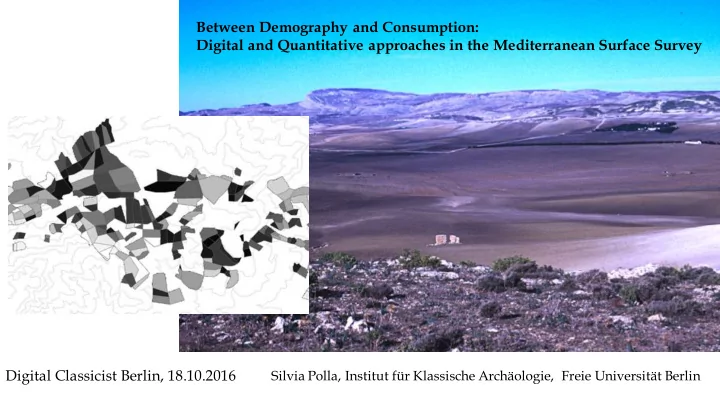

Between Demography and Consumption: Digital and Quantitative approaches in the Mediterranean Surface Survey Digital Classicist Berlin, 18.10.2016 Silvia Polla, Institut für Klassische Archäologie, Freie Universität Berlin
Hobson 2012
Hobson 2012
Hobson 2012
de Vos, Attoui 2012 Hobson 2012 Hobson 2012, after Bonifay 2004
Bonifay 2004
Economic structure Location Economic mechanism Archaeological correlates Imperial Economy Empirewide and Taxation, imperial Monetization focused exploitation on military needs, tax beyond frontiers gathering (Egyptian of land, labor, tax grain resources, arrangements, etc.); redistribution, long range movement largesse, and salary of many commodities commitments to frontier provinces or Rome, military bias in distribution patterns Extraprovincial Empirewide and Free-market economy, Interprovincial Economies beyond frontiers movement response to of goods to local opportunities markets, of imperial supply, gift consumption of exchange imported goods on civilian sites Provincial Economies Within provincial Free-market economy, Local market distributions borders, often response to taxation, of locally produced localized around monetization goods, major towns spread of monetization to smaller market centers Mattingly 2011, 139, Tab 5.2
de Vos, Attoui 2012
Stone 2004
de Vos 2013
Hobson 2012 de Vos, Attoui 2012
Hobson 2012
Topography (Slope facing) Duration of occupation Nr Farms (tot = 48 belonging to the Vandal- Byzantine Phase) North 6 North-West 2 West 1 South 2 South-East 2 East 6 North-East 6 North 1 Flat 22 0 5 10 15 20 25 Soil quality Test on 257 „ farms “, all periods 65; 25% 192; 75% good soils bad soils
Nucleated settlements Farms
Ceramic Classes 0,53% 2,50% 2,01% Sites with no ARS Ware 0,01% ARS 15,77% 0,05% CW 0,41% ACW HM BGW IS 27,77% GLA CBM DW AMPH PW 38,56% LA 0,57% MW M >>Very poor assemblages OS 7,97% 1,15% TW 0,65% 0,08% 0,25% 1,72% Correlation between ceramic classes in the surface assemblages Insch Press CW ACW HM BGW IS GLA CBM DW AMPH PW LA ARS correlation ,153 ** ,318 ** ,892 ** ,506 ** ,484 ** ,193 ** ,337 ** ,444 ** ,683 ** ,446 ** ,772 ** ,153 ** ,523 ** coefficient
Rajala, Mills 2014
Rajala, Mills 2014
Dougga Survey: Clusteranalysis of „ Farms “ Methods: hierarchical Clusteranalysis, Ward-Method, Gower-Distance Single Variables: „Location“ + „Size“ + „ Slope “ + „ Inscriptions “+ „ Oil presses “ + „ Ceramic Classes („ARS","CW","ACW","HM","BGW"," IS","GLA"," CBM“," DW","AMPH","PW","LA","TW „)“, + + „Phase1",„Phase2",„Phase3",„Phase4",„Phase5",„Phase6",„Phase7" Group 1: 119 Group 2: 10 Group 3: 44
140 120 100 80 60 40 20 0 Pre-Roman Early Roman Middle Late Roman Vandal Byzantine Islamic Roman Total sites 160 140 120 100 Byzantine 80 60 40 20 0 Early Roman Middle Roman Late Roman Vandal Byzantine Islamic New Continuing Reoccupied Abandoned
Dougga Survey: Fine Wares Distribution pots = sites = people ? > Population growth vs decline ?
0 1 2 3 4 5 6 year 60 year 75 year 90 year 105 year 120 year 135 year 150 ARS-based Survey Chronology (Weighted mean/year) year 165 year 180 year 195 year 210 year 225 year 240 year 255 year 270 year 285 year 300 year 315 year 330 year 345 year 360 year 375 year 390 year 405 year 420 year 435 year 450 year 465 year 480 year 495 year 510 year 525 year 540 year 555 year 570 year 585 year 600 year 615 year 630 year 645 year 660 year 675 year 690
Dougga Survey: Site Density and Settlement Pattern
Dougga Survey: Theoretical territories
Dougga Survey: Cost Distance Analysis
Dougga Off-site Pottery Survey Survey Intensity/ Number of sites Terrenato 2004 Visibility / Number of sites 2.5 2.5 2. 2. 5 5
Witcher 2006
Mapalia , El Alia (Mahdia, II AD). /Ha Ceramics/ha Archaeological record and past social variability
Recommend
More recommend